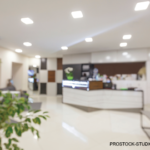 Editor’s note: ACR on Air, the official podcast of the ACR, dives into topics important to the rheumatology community, such as the latest research, solutions for practice management issues, legislative policies, patient care and more. Twice a month, host Jonathan Hausmann, MD, a pediatric and adult rheumatologist in Boston, interviews healthcare professionals and clinicians on the rheumatology front lines. In a series for The Rheumatologist, we provide highlights from these relevant conversations. Listen to the podcast online, or download and subscribe to ACR on Air wherever you get your podcasts. Here we highlight episode 62, “Joining a Practice,” which aired on Sept. 12, 2023.
Editor’s note: ACR on Air, the official podcast of the ACR, dives into topics important to the rheumatology community, such as the latest research, solutions for practice management issues, legislative policies, patient care and more. Twice a month, host Jonathan Hausmann, MD, a pediatric and adult rheumatologist in Boston, interviews healthcare professionals and clinicians on the rheumatology front lines. In a series for The Rheumatologist, we provide highlights from these relevant conversations. Listen to the podcast online, or download and subscribe to ACR on Air wherever you get your podcasts. Here we highlight episode 62, “Joining a Practice,” which aired on Sept. 12, 2023.
Whether you completed your rheumatology fellowship this year or decades ago, you may relate to feeling passionate and determined to start your career while also being unsure about what practice setting will work best for you. Although many rheumatologists consider careers in academia or a hospital setting, community practice remains an option. Some rheumatologists may be unsure what to expect from working in private practice.
In an episode of ACR on Air, Sunil Abraham, MD, a rheumatologist at Asheville Arthritis & Osteoporosis Center, North Carolina, shared his experience working in different rheumatology settings and why he ultimately chose private practice. He also shared details on the pros and cons of working in community practice and what it really means to be a partner in one.
A Family Model
Dr. Abraham’s father was a surgeon in a small town in upstate New York, and his exposure to that setting influenced how Dr. Abraham thought about his future. While completing his rheumatology fellowship at the University of Pittsburgh, he was exposed to academic rheumatology, but also spent time in the university’s community affiliates.
“That [experience] really showed me the other side of rheumatology, seeing patients in a completely different setting and pace,” he said.
With many family members in upstate New York and a wife who is also a physician, Dr. Abraham used the ACR directory to look up practices in the area he wanted to be in and reached out to them about working there. He found a private practice he wanted to join, one with the promise of a partnership.
“Like I said, I was influenced a lot by my dad—who was a community surgeon—but he was always in private practice. I saw the autonomy he was able to exercise, and I really appreciated that,” he said.
Dr. Abraham did not become a partner in that practice, but he learned the value of having a clearly defined pathway to partnership.
“That [pathway] includes getting down and dirty with the details. I want fellows and other rheumatologists who are considering changing what their current practice profile is not to be nervous about learning how you’re valued and [defining] what your plan is,” Dr. Abraham said.
Moving On
Next, Dr. Abraham worked at a hospital for two-and-a-half years. The position included a signing bonus and a salary increase. Although Dr. Abraham initially enjoyed his time there, he experienced many of the challenges of the hospital setting, such as being told he wasn’t productive, despite seeing 20–22 patients a day.
“It’s disheartening,” he said, noting that he was only three years out of his fellowship and still finding his footing as an independent rheumatologist. He realized that the hospital setting was not the best work situation for him.
Dr. Abraham returned to work at the private practice he had been part of before, with talk of becoming a partner but, ultimately, no partnership agreement. He became chief business officer at the practice for about a year, leveraging his undergraduate minor in finance. But he still found himself seeing a full-time panel of patients.
Eventually, Dr. Abraham discovered the practice where he’s currently a partner in North Carolina. He has been there for seven years.
What It Means to Be a Partner
Dr. Abraham detailed how partnership works in his practice, likening it to eight individual businesses, one for each partner. Each partner has fixed costs toward the rent and equipment, such as radiographic and dual-energy X-ray absorptiometry equipment.
When he joined the practice in North Carolina, he said the other partners were transparent, showing him the financials and how the practice generally fares. The partners collaborate to make decisions about investing in real estate or adding administrative staff.
At the end of a designated financial period, as long as a partner has more of a net revenue in their service line, they can continue earning the same amount of money. A cut in salary may occur if this balance is not the case. But partners may contribute more financially if someone has to take time off for personal reasons, such as taking care of an ill parent or child.
“It’s really a work marriage, and you have to have common goals and get along,” Dr. Abraham said.
Risk is involved with becoming a partner in private practice. Big events, such as a fire, a hack into the electronic medical records system and other unforeseen circumstances, can affect the practice. Reimbursement changes are also a continuous threat to revenue.
“Learning what those risks are [is important], and if you are with other like-minded rheumatologists, you learn how to mitigate those risks,” he said.
Daily Life in a Community Practice
When he was building his practice, Dr. Abraham initially saw about 18–20 patients per day. That’s now down to 15–16 patients a day, which includes three new patients daily. This workload is in addition to administrative tasks and shifting some work to his medical assistant.
“At this point in my life and my career, I can handle that, and I can spend that much more time with the patient,” he said.
On occasions when Dr. Abraham has to pick up a daughter who is sick, that is possible to do within his current work setting. “The scheduling flexibility that we have is amazing because I know the numbers. If I need to take care of my wife for something or go to a medical appointment, I can do it and it’s not a big deal,” he said.
Although the practice initially covered a hospital when he first joined, that no longer happens due to the associated scheduling challenges.
For vacations, having the backup of seven other rheumatologists, as well as one mid-level practitioner, enables Dr. Abraham and colleagues to actually take that time off.
Professional Goals
Dr. Abraham encourages rheumatologists deciding what type of practice setting works best for them to be loyal to themselves and their professional goals and desires.
“I hope doctors can think of themselves not only as physicians, but [also] as folks who [bring] value to where we are. That value is not only providing excellent medical care, which is an honor, but that value is also a business value and a financial value,” he said.
To better understand community practice rheumatology, Dr. Abraham recommends the ACR’s Community Practice Council (CPC) as a good resource. He is a member of the CPC. Contact the council via email at [email protected].
Editor’s note: Learn more about community practice.
Vanessa Caceres is a medical writer in Bradenton, Fla.
More Episodes
A new episode of ACR on Air comes out twice a month. Listen to this full episode and others online at acronair.org. Or download and subscribe wherever you get your podcasts.



